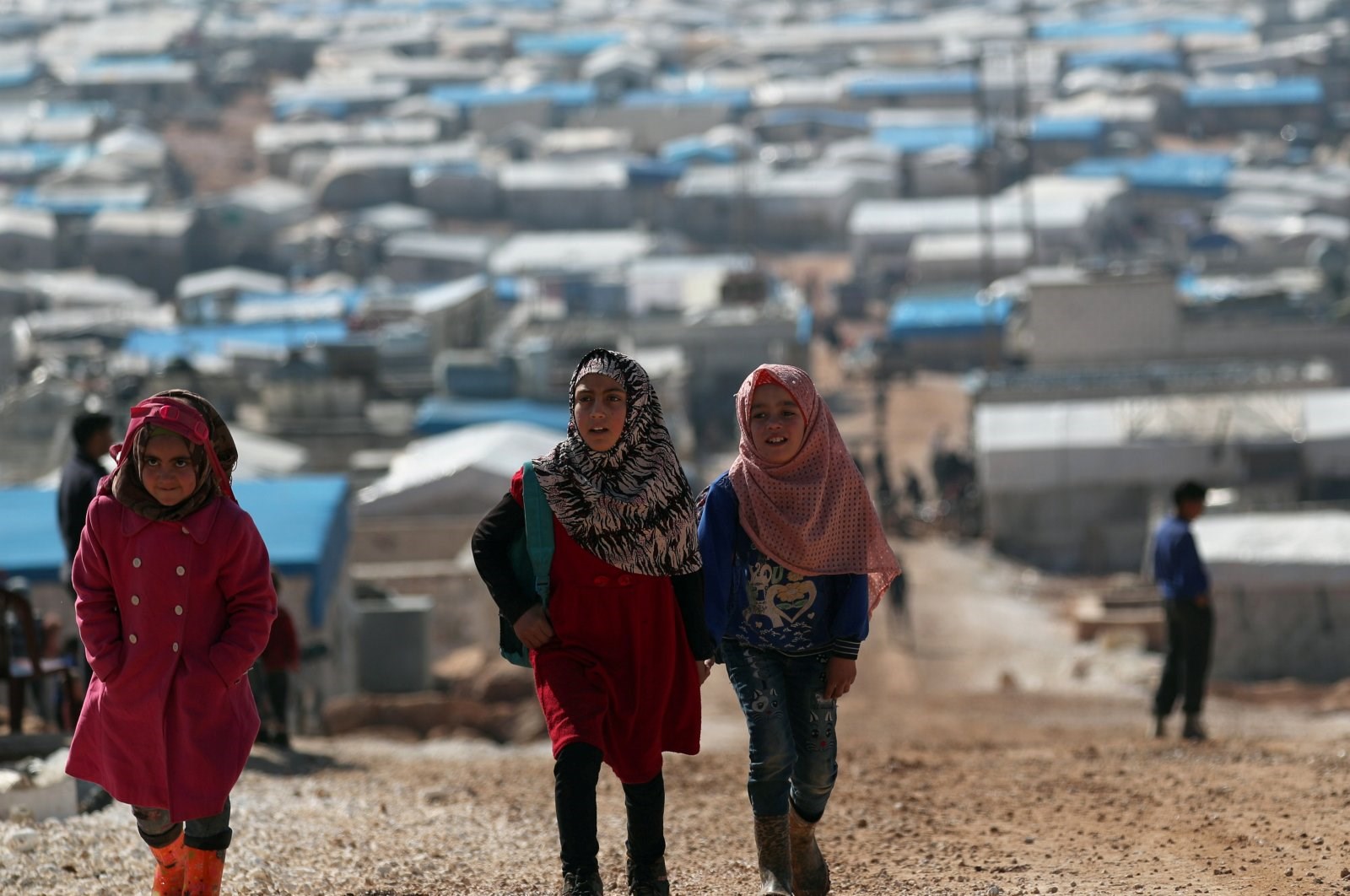Turkish elections will decide the fate of the Syrian question: Report
Given that candidate Kemal Kilicdaroglu comes from a large religious minority, the Alevi Muslims, the Syrian crisis has been a point of tension between the Alevis and Turkish President Recep Tayyip Erdogan's AKP ruling party.
-

Internally displaced Syrian students walk together in Atmeh IDP camp, located near the border with Turkey, Syria, March 4, 2020 (Reuters)
The Syrian refugee question is and has been a sensitive matter to the Turks and to Turkish foreign policy, as opposition candidate Kemal Kilicdaroglu suggested the proposal to normalize Ankara’s diplomatic relationship with Syrian President Bashar al-Assad’s government. That entails a joint agreement with Syria to ensure the safe return of Syrian refugees and the joint rebuilding efforts of Syria via Turkish companies with UN and EU funding.
Given that the candidate comes from a large religious minority, the Alevi Muslims, the Syrian crisis has been a point of tension between the Alevis and Turkish President Recep Tayyip Erdogan's AKP ruling party.
A year after the war on Syria began, chairman of the Federation of Alevi associations in Turkey, Selahattin Ozel said: “As Turkish Alevis, we do not support an anti-democratic, an anti-humanist regime [in Syria], but we cannot understand why [Erdogan] so suddenly became an enemy of the Syrian administration.”
Still, in recent years, Turkey-Syria relations have been developing, and have been highlighted especially during the high-level meeting between Turkish, Syrian, and Russian ministers in Moscow back in December 2022 and following the engagement between Ankara and Damascus this year.
Read more: Turkey has four points to discuss in quadripartite meeting next month
According to experts, however, if Kilicdaroglu wins the election on May 14, Turkey and Syria’s governments would move faster.
In an interview with Responsible Statecraft, Steven Cook, the Eni Enrico Mattei senior fellow for Middle East and Africa studies at the Council on Foreign Relations, stated: “Although President Erdogan and…Kilicdaroglu both want to normalize relations with Damascus, it is more likely under the latter’s leadership,” adding that "The [CHP]…was always opposed to Erdogan’s regime change policy in Syria. As a result, whatever change is in the offering for Turkey’s Syria policy, it is likely going to be easier under Kilicdaroglu.”
“I expect normalization to proceed relatively quickly, especially if Kilicdaroglu commits to a Turkish withdrawal,” Cook clarified, explaining: “I would not be surprised if Damascus is among the first capitals Kilicdaroglu visits should he become president.”
Dr. Joshua Landis, director of the Center for Middle East Studies at the University of Oklahoma, expressed to Responsible Statecraft that “Assad would like Erdogan to lose but must be polite should he prevail".
“Assad and Erdogan do not like each other. Turkey occupies ten percent of Syria and was the leading backer of militias seeking Assad’s overthrow.”
Per Responsible Statecraft, Turkish-Syrian relations will most likely keep developing, regardless of who takes the win, taking into consideration as well Syria's reintegration into the League of Arab States after a 12-year absence.
Colin P. Clarke, the director of policy and research at the Soufan Group told the outlet that “Syria seems to be on the fast track to having normalized relations thanks to help from Abu Dhabi. Damascus is in a better position than just a few years ago, even if Erdogan wins reelection".
Read next: Turkish Elections 2023: Resurrecting Ataturk or the Empire?
The question remains, though, to what extent has Erdogan’s diplomatic engagement with Assad been about Erdogan's genuine drive for normalization with Syria, or has this been an attempt at gaining domestic support ahead of the pivotal election?
“Needless to say, Erdogan’s honeyed words about reconciliation with Syria are designed for the elections. Should Erdogan win [this month], negotiations will begin in earnest,” Landis said.
“Erdogan’s position on normalization and sending Syrians back to Syria are opposition positions that are popular, which is why Erdogan adopted them,” said Cook.
“It is unclear whether he will pursue normalization with particular vigor, especially since he has demonstrated little interest in meeting Assad’s demand that Ankara withdraws its troops from Syrian territory.”

 4 Min Read
4 Min Read










